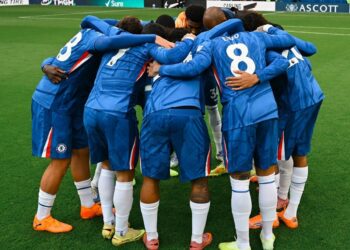A Barcelona court has delivered a landmark ruling in the fight against racism in Spanish football, sentencing an Espanyol supporter to one year in prison for racially abusing Athletic Bilbao striker Iñaki Williams during a La Liga match in January 2020. The case, which has taken over five years to reach resolution, represents a significant milestone in Spain’s ongoing battle against discrimination in football stadiums.
Table of Contents
The Court Ruling: Justice After Five Years
The High Court of Justice of Catalonia issued its verdict on September 3, 2025, finding the defendant guilty of crimes against fundamental rights and freedoms. While the unnamed Espanyol fan received a one-year prison sentence, Spanish law dictates that sentences under two years for first-time offenders with no prior criminal record are typically suspended, meaning he will not actually serve jail time.

However, the court imposed additional penalties that carry real consequences. The convicted fan must pay a fine of approximately €1,086 and faces a three-year ban from all football stadiums. Perhaps most significantly, the ruling includes a four-year prohibition from working in educational or sports-related sectors, demonstrating the court’s recognition of the broader social implications of racist behavior.
Details of the 2020 Incident
The racist abuse occurred during Athletic Bilbao’s 1-1 draw against Espanyol at the RCDE Stadium on January 25, 2020. The incident took place when Williams was substituted late in the game and walked past the stands behind the goal, where fans directed monkey sounds and gestures at the Ghanaian-born striker.
| Case Timeline and Penalties | Details |
|---|---|
| Incident Date | January 25, 2020 |
| Court Ruling Date | September 3, 2025 |
| Prison Sentence | 1 year (suspended) |
| Fine Amount | €1,086 |
| Stadium Ban | 3 years |
| Professional Ban | 4 years (education/sports) |
| Prosecutor’s Original Demand | 2 years imprisonment |
Court documents reveal that the racist chants came from section 108 of the stadium stands, where the accused sat and acted “with evident disregard for the player’s skin colour”. The prosecution noted that the incident occurred in front of 27,000 spectators in the ground, over 200,000 TV viewers, and an undetermined number of radio listeners, amplifying the public humiliation suffered by Williams.
Williams’ Impact Statement and Testimony
In his impact statement to prosecutors, Williams described experiencing feelings of “unacceptable humiliation that it could still occur in 2025”. The Athletic Bilbao striker, who has become one of the most prominent voices against racism in Spanish football, emphasized how the abuse affected his dignity and professional performance.
The prosecutor stated that Williams suffered “frustration, shame, and humiliation” and that his “dignity” had been attacked during the incident. Video footage from the match showed Williams confronting the section of Espanyol supporters responsible for the abuse, highlighting the immediate impact of the discriminatory behavior.
Espanyol’s Response and Ongoing Issues
While Espanyol condemned the incident and announced they had identified 12 fans involved in the racist abuse, only one fan could be fully identified by authorities to be taken to trial. This highlights the ongoing challenge of holding multiple perpetrators accountable when racist incidents occur in crowded stadium environments.

Troublingly, there was a second instance of racist abuse directed at Williams at Espanyol in 2022, and a third in 2025, which remains under investigation by Catalan authorities. The most recent incident occurred in February 2025, when the referee activated La Liga’s anti-racism protocol and stopped the match for three minutes after racist chants were directed at Williams’ teammate Maroan Sannadi.
La Liga’s Anti-Racism Protocol in Action
The February 2025 incident at Espanyol served as a test of La Liga’s enhanced anti-racism measures. The latest incident was a test of La Liga’s tightening measures on incidents of racism in stadiums with play stopped for three minutes as a warning announcement was played over the tannoy system.
| Recent Racist Incidents at Espanyol vs Athletic | Details |
|---|---|
| January 2020 | Williams racially abused – Court case concluded |
| 2022 | Second incident involving Williams – Under investigation |
| February 2025 | Maroan Sannadi targeted – Protocol activated |
| Match Stoppage | 3 minutes with stadium announcement |
Broader Context: Spain’s Fight Against Stadium Racism
This ruling comes amid Spain’s intensified crackdown on racist behavior in football stadiums. In June 2024, three Valencia fans were given eight-month prison terms for insulting Real Madrid’s Vinícius Júnior, while in May 2024, five Valladolid fans were found guilty in the first ruling in Spain that condemned racist insults in a soccer stadium as a hate crime.
The Williams case represents another significant step in Spanish football’s evolution toward zero tolerance for discrimination. La Liga issued a statement declaring that “Today’s ruling represents another milestone in the fight against racism in football and the eradication of all forms of violence inside and outside stadiums”.
The Williams Brothers: Symbols of Resistance
Both Iñaki Williams and his younger brother Nico Williams, who plays for Spain’s national team, have become powerful symbols in the fight against racism in Spanish football. Nico Williams reported being targeted with “monkey” shouts while taking a corner kick during a match against Atlético Madrid, demonstrating that the problem extends beyond isolated incidents.

The brothers’ prominence in Spanish football has made them particularly visible targets for racist abuse, but also influential advocates for change. Their willingness to speak out and pursue legal action has helped establish important precedents for addressing discrimination in Spanish sports.
Legal Implications and Deterrent Effect
The suspended prison sentence, while not resulting in actual jail time, carries significant symbolic weight and practical consequences. The three-year stadium ban effectively removes the perpetrator from football environments where similar incidents might occur, while the prohibition from working in educational or sports sectors recognizes the broader social responsibility that comes with such positions.
Spanish prosecutors had initially sought a two-year sentence, which would have likely resulted in actual imprisonment. However, the deal reached between the prosecution and defense still represents a strong statement against racist behavior.
Impact on Stadium Culture and Fan Behavior
The ruling sends a clear message to football supporters across Spain that racist behavior will face serious legal consequences. The combination of financial penalties, stadium bans, and professional restrictions creates multiple deterrents designed to prevent similar incidents.
However, the persistence of racist incidents at venues like Espanyol’s RCDE Stadium suggests that legal action alone may not be sufficient to eliminate discriminatory behavior. The fact that Williams has faced abuse at the same venue on multiple occasions indicates that cultural change within fan communities remains an ongoing challenge.
Looking Forward: The Road to Change
As Spanish football continues its fight against racism, the Williams case serves as both a success story and a reminder of work still to be done. The court’s recognition of racist abuse as a serious crime with real consequences represents progress, but the continued occurrence of similar incidents shows that comprehensive solutions require more than legal remedies.

The involvement of La Liga as a co-plaintiff in the case demonstrates the league’s commitment to supporting players who face discrimination. This institutional support, combined with enhanced protocols for dealing with racist incidents during matches, suggests a systematic approach to addressing the problem.
The Williams case ultimately highlights both the progress made and the challenges remaining in Spanish football’s battle against racism. While legal victories like this one provide important precedents and deterrents, the ultimate goal of eliminating discriminatory behavior from stadiums will require continued vigilance, education, and cultural change within fan communities across Spain.
Read More: Barcelona Defender Alejandro Balde Injured: Three Weeks Out With Hamstring Problem
FAQs
What sentence did the Espanyol fan receive for racially abusing Inaki Williams?
The fan received a one-year prison sentence (suspended), a €1,086 fine, a three-year stadium ban, and a four-year prohibition from working in educational or sports-related sectors.
When did the racist incident involving Inaki Williams at Espanyol occur?
The incident took place on January 25, 2020, during Athletic Bilbao’s 1-1 draw against Espanyol at the RCDE Stadium in Barcelona.
Will the convicted fan actually serve prison time?
No, under Spanish law, prison sentences under two years for first-time offenders with no prior criminal record are typically suspended, so he will not serve jail time.
Has Inaki Williams faced racist abuse at Espanyol on other occasions?
Yes, there have been additional incidents in 2022 and 2025, with the most recent case still under investigation by Catalan authorities.
How does this case fit into Spain’s broader fight against football racism?
This ruling follows similar cases involving Real Madrid’s Vinícius Júnior and represents part of Spain’s intensified crackdown on racist behavior in football stadiums, with multiple fans receiving prison sentences in recent years.








